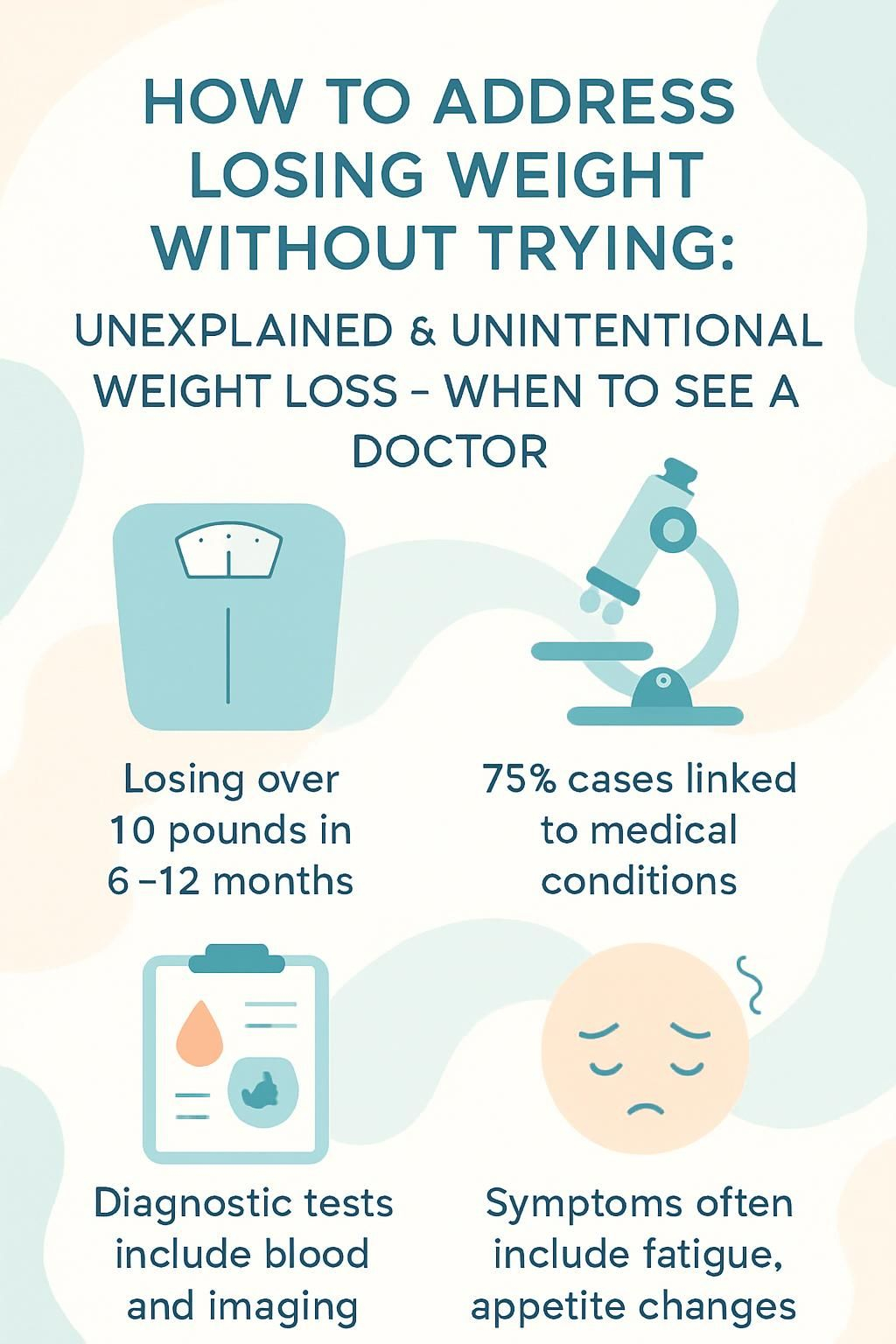How To Address Losing Weight Without Trying: Unexplained & Unintentional Weight Loss – When To See A Doctor
Our Nutrition Assistant AI Suite will transform your body. You will lose fat, get toned, and build muscle. Gain confidence and optimal health.
If you notice you are losing weight without trying, it can feel unsettling. Unexplained weight loss means dropping more than 10 pounds, or at least 5% of your body weight, over six to twelve months without diet or activity changes. This pattern can point to an underlying medical condition, such as cancer, diabetes, or thyroid disease.
This guide outlines the possible causes of unintentional weight loss, key warning signs, and when to see a doctor. Use it to spot issues early and protect your health.
Key Takeaways
- Unintentional loss of more than 10 pounds or 5% of body weight within six to twelve months needs medical attention, according to Mayo Clinic staff.
- Most cases link to health conditions such as cancer, diabetes, thyroid problems, digestive diseases like Crohn’s disease or celiac disease, or mental health concerns.
- Evaluation often includes blood work, urine tests, cancer screening such as colonoscopy, and imaging like CT or MRI. Nutrition testing may also help.
- Common paired symptoms include fatigue, appetite changes, diarrhea, nausea, vomiting, and muscle weakness. Seek care sooner if several occur together.
- Yearly checkups and timely visits help find causes early. The CDC encourages preventive care to improve long-term outcomes.

Understanding Unexplained and Unintentional Weight Loss

Unintentional weight loss can be a signal, not a fluke. When weight drops for no clear reason, the goal is to understand why and act early.
What Is Unintended Weight Loss?
Unintended weight loss means you lose weight without trying to change your eating or activity. Doctors often define it as more than 10 pounds, or over 5% of your usual weight, in six to twelve months.
You might see the scale fall even though your meals and movement look the same. In many cases, a medical condition is driving it. Common causes include thyroid disease, cancer, diabetes, and digestive problems such as Crohn’s disease and ulcerative colitis. Older adults face higher risk, both at home and in long-term care.
In my family, a grandparent once lost nearly fifteen pounds in four months. Testing showed early diabetes. Catching the change led to quick treatment and better control.
How Much Weight Loss Is Concerning?
Health experts advise paying attention if you lose more than 5% of your usual body weight in six to twelve months without trying. For a 150-pound person, that is about 7.5 pounds in half a year, or roughly 10 pounds in a year.
Older adults should monitor changes closely. Unintentional loss can link to cancer, celiac disease, Crohn’s disease, depression, anxiety, or medication side effects. Small daily shifts of 2 to 5 pounds are usually fluid changes and are not a concern by themselves.
Spot trends early. It improves the chance of finding the cause and starting treatment sooner.
| Weight Change | Time Frame | Group |
|---|---|---|
| More than 5% of usual weight | 6 to 12 months | Any adult |
| About 10 pounds | 6 to 12 months | Any adult |
| Sudden unexplained drop | Rapid | Adults over 65 |
Share any clear pattern with your clinician. It helps them decide if issues in the digestive system or hormones might be involved.
Common Causes of Unexplained Weight Loss
Unexplained weight loss can result from medical conditions that change appetite, digestion, or metabolism. Knowing the common causes helps you decide when to seek care.
Which Health Conditions Cause Weight Loss?
Many conditions can lead to weight loss even if you are eating normally. These often affect hormones, digestion, or energy use.
- Cancer such as colorectal or pancreatic cancer can reduce appetite and increase energy use. A sizable share of adults with unexplained weight loss will have a new cancer diagnosis.
- Digestive diseases, including Crohn’s disease, celiac disease, ulcerative colitis, pancreatitis, and peptic ulcer disease, can cause poor absorption and calorie loss.
- Endocrine disorders, such as hyperthyroidism and Addison’s disease, disrupt hormones like cortisol and aldosterone that regulate metabolism and fluids.
- Diabetes can cause the body to burn fat and muscle for energy when glucose does not enter cells properly.
- Mental health conditions like depression and anxiety can lower appetite and increase fatigue, leading to reduced intake.
- Infections, including HIV and certain parasites, can drive chronic inflammation and nutrient loss.
- Substance use, including heavy alcohol use, may reduce intake and cause vomiting or diarrhea.
- Heart failure can cause early fullness and fatigue, which lowers calorie intake.
- Eating disorders, such as anorexia nervosa and bulimia nervosa, involve restriction or purging that reduces weight quickly.
Other symptoms often appear along with weight loss. They can offer strong clues about the cause.
How Does Hyperthyroidism Affect Weight?
Hyperthyroidism happens when the thyroid gland makes too much hormone. These hormones control metabolism, which is how your body uses energy. With too much hormone, you burn calories faster than usual.
People can lose more than 5% of body weight over months without changing how much they eat. Signs and symptoms include increased hunger, sweating, a fast heartbeat, feeling tired, and sometimes loose stools. Clothes may feel looser, and the number on the scale drops with no clear reason.
If you notice these changes, ask your doctor about checking thyroid levels.
Can Diabetes Cause Weight Changes?
Diabetes can cause unintentional weight loss, especially when blood sugar is high and not well controlled. Glucose stays in the blood and does not reach the cells for energy. The body then breaks down fat and muscle instead.
Warning signs include increased thirst, frequent urination, fatigue, and more hunger along with weight loss. Both type 1 diabetes and advanced type 2 diabetes can do this. If you lose more than 5% of your weight in six months without trying, schedule a medical visit.
What Digestive Issues Lead to Weight Loss?
Digestive problems are a frequent cause of unexpected weight loss. Diseases like celiac disease damage the small intestine and block nutrient absorption. Inflammatory bowel disease, including Crohn’s disease, often causes long-term diarrhea and cramps that limit calorie intake.
Repeated vomiting or laxative overuse can also reduce weight. These conditions prevent the body from absorbing protein, fats, vitamins, and minerals. Ongoing symptoms deserve a full workup, which may include a medical history review, stool tests, or colonoscopy.
How Is Cancer Related to Weight Loss?
Unexplained weight loss can be the first sign of cancer. It may reduce appetite, change taste, and interfere with digestion. Cancers of the colon, pancreas, lung, esophagus, gallbladder, and liver are often linked with noticeable weight changes.
In clinics, many people first seek care because they lost more than ten pounds without trying. Routine screening and prompt evaluation can detect some cancers earlier, which improves options for treatment.
What Are the Effects of Adrenal Insufficiency?
Adrenal insufficiency, also called Addison’s disease, happens when the adrenal glands do not make enough cortisol and aldosterone. Cortisol helps the body respond to stress and manage energy. Aldosterone helps control salt and water balance.
Low levels can cause nausea, vomiting, diarrhea, fatigue, and low appetite. Some people lose weight even without diet changes. Over time, bone health may suffer. Early diagnosis and treatment help prevent complications.
How Do Mental Health Issues Cause Weight Loss?
Mental health conditions are common drivers of unintentional weight loss. Depression, anxiety, and obsessive-compulsive disorder can reduce appetite, disrupt sleep, and drain energy. Medications for these conditions may also change taste or cause nausea.
Some people skip meals without meaning to, or feel full after only a few bites. When mood improves, eating patterns often improve as well. Talk with your clinician if mood shifts and weight loss happen together.
How Does Depression Impact Weight?
Depression can lower interest in food and reduce appetite. Some people lose five or more pounds without trying. Food may not taste good, which further reduces intake.
Depression medicines can sometimes cause nausea or decrease hunger. Health teams often monitor weight during treatment so they can adjust the plan if needed. Addressing depression early often stabilizes eating and weight.
What Is the Connection Between Anxiety and Weight Changes?
Anxiety puts the body on high alert, which can raise energy use and reduce hunger. Some people feel queasy, skip meals, or stop eating halfway through. Others find that anxiety medicines reduce appetite.
If you lose more than 5% of your weight in six months, call your doctor. Treating anxiety often brings appetite back, which supports steady weight.
Can Stress Cause Weight Loss?
Chronic stress releases hormones such as cortisol and adrenaline. These chemicals can speed metabolism yet blunt appetite at the same time. Stress also disrupts sleep and may cause stomach issues like diarrhea.
During a tough exam period, I lost eight pounds in two months because worry cut my appetite. When the stress eased and meals became regular again, my weight stabilized. If stress and weight change together, ask your clinician for support and strategies.
How Do Lifestyle Factors Influence Body Weight?
Daily habits strongly influence weight. Sudden shifts in routine can lead to unintentional loss.
- Diet changes, including skipping meals, often reduce calorie intake and lead to weight loss.
- Alcohol use can harm the liver, change appetite, and trigger diarrhea. Heavy use raises the risk of unintentional loss.
- Too little sleep disrupts hormones that regulate hunger and fullness, which can make weight less stable.
- Substance use, including illicit drugs, can suppress appetite and cause stomach problems that reduce nutrient absorption.
- Money stress or trouble getting food can lead to inconsistent meals and loss of 10 pounds or more.
- Some prescriptions, such as thyroid medicine or steroids, can shift body composition. Report any sudden changes after starting a new drug.
- After my cancer surgery, a new medication led to unwanted weight loss. A dose change solved it.
Watch for physical symptoms along with lifestyle shifts. Patterns help your provider uncover the cause.
How Do Dietary Changes Affect Weight?
Changing your eating pattern can quickly change your weight. Cutting calories, skipping meals, or relying on laxatives lowers intake and can cause noticeable loss within weeks.
Dental problems also limit chewing and may reduce food choices, which increases the risk for malnutrition. Conditions that cause malabsorption prevent your gut from absorbing nutrients. If you change your diet due to pain or illness and see quick loss on the scale, schedule a checkup.
Can Substance Use Change Your Weight?
Substance use disorders, including alcohol misuse, often lead to major weight shifts. Alcohol can damage the liver and cause frequent diarrhea. Both reduce nutrient absorption and calorie intake.
Some drugs suppress appetite and speed up weight loss. Muscle mass can drop if protein intake falls. If you notice weight loss while using substances, seek medical help. Early support lowers the risk of serious complications.
What Medications Cause Weight Changes?
Several medications can cause weight loss or gain. Knowing the possibilities helps you respond quickly.
- Antidepressants such as fluoxetine and bupropion may lower weight. Others, including mirtazapine, often increase it.
- Diabetes therapies like metformin can promote weight loss. Some insulin regimens and sulfonylureas may raise weight.
- Cancer treatments, including chemotherapy, can dull taste, reduce appetite, and cause nausea.
- Thyroid medications like levothyroxine can cause loss if the dose is too high.
- Stimulants for ADHD or obesity often suppress appetite and reduce intake.
- Corticosteroids can increase fat while weakening muscle over time due to metabolic effects.
- HIV medications vary, with some increasing fat stores and others reducing them.
- Diuretics reduce fluid, which can look like quick weight loss but is mostly water.
- Anti-seizure drugs such as topiramate have been linked with weight reduction.
If weight shifts after starting a new medicine, ask your doctor if the drug might be the cause. Never stop a prescription without guidance.
Symptoms That Occur With Unintentional Weight Loss
Weight loss without trying often appears with other signs. These symptoms can speed up diagnosis and treatment.
Why Does Fatigue Occur With Weight Loss?
Fatigue is common when weight drops fast. Loss of fat and muscle lowers energy reserves, which reduces stamina. Some conditions speed metabolism or block the body from using calories well, which also drains energy.
Digestive diseases reduce nutrient absorption. Depression and anxiety can disturb sleep and appetite, which deepens fatigue. Doctors often use exams, blood tests, and imaging to find the cause.
| Cause | How It Leads to Fatigue |
|---|---|
| Loss of muscle or fat | Reduces stored energy for daily tasks |
| Chronic disease, for example cancer | Alters metabolism and energy use |
| Hyperthyroidism | Speeds calorie burning and tires the body |
| Digestive issues | Block nutrient absorption needed for energy |
| Mental health conditions | Disrupt sleep and appetite, leading to tiredness |
If fatigue appears with weight loss or other symptoms, contact your healthcare provider for testing and advice.
How Does Loss of Appetite Affect Weight?
Loss of appetite means you eat less, so your calorie intake falls. Over time, that causes weight loss even if you did not aim for it. Conditions such as Addison’s disease or depression often reduce hunger.
Clothes may feel looser and daily tasks may feel harder. If appetite loss occurs with tiredness or stomach problems, ask for a medical visit. Many causes are treatable once identified.
What Digestive Symptoms Accompany Weight Loss?
Nausea, vomiting, diarrhea, and changes in bowel habits often appear with unintentional weight loss. Celiac disease, Crohn’s disease, pancreatitis, and ulcers are common examples.
You might notice belly pain after meals, bloating, or trouble with certain foods. If these symptoms persist with weight loss, you need an evaluation to find the cause and protect your nutrition.
How Is Muscle Weakness Linked to Weight Loss?
When intake is too low, the body may use muscle for energy. In diabetes, cells struggle to use glucose, so the body breaks down fat and muscle instead. That leads to weakness and weight loss together.
Cancer and malnutrition can also shrink muscle mass. If routine tasks feel harder after a period of unplanned loss, tell your doctor. Muscle loss can be reversed with the right plan.
Diagnosing Unexplained Weight Loss
Diagnosis starts with your story and a focused exam. The goal is to find the cause and treat it quickly.
What Happens During a Medical Evaluation for Weight Loss?
Your clinician reviews your medical history, weight trend, appetite, activity, medicines, and mental health. They ask about symptoms such as nausea, diarrhea, pain, fever, and night sweats. Substance use and sudden diet changes are also discussed.
During one of my evaluations, the team looked at stress levels and sleep alongside labs. A complete picture helps guide safe testing and treatment.
Which Diagnostic Tests Are Essential for Weight Loss?
Doctors use several tests to identify the cause of unexplained loss. You may have some or all of the following:
- Blood tests to check thyroid function, adrenal function, celiac markers, diabetes, inflammation, and infection.
- Urinalysis to assess kidney health and look for infection or sugar in the urine.
- Cancer screening, for example colonoscopy, based on age, risk, and symptoms.
- Imaging such as X-ray, CT scan, or MRI to look for tumors, inflammation, or organ problems.
- Endoscopy to view the esophagus, stomach, and intestines when digestive disease is suspected.
- Stool tests to check for blood, parasites, or bacteria that affect weight and nutrition.
- Nutrition labs to measure levels of vitamins and minerals linked to malnutrition.
Combining your history with test results speeds diagnosis and helps tailor treatment.
How Do Blood Tests Help Diagnose Weight Loss Causes?
Blood work offers key clues. Thyroid tests can show hyperthyroidism, which speeds metabolism. Adrenal tests can detect adrenal insufficiency, which affects energy and fluid balance.
Antibody tests can reveal celiac disease. Metabolic panels help identify problems with blood sugar and electrolytes seen in diabetes or kidney disorders. With a few tubes of blood, your doctor can rule in or rule out several causes.
What Imaging Techniques Are Used for Diagnosis?
Imaging shows what is happening inside your body. CT scans can reveal tumors, infections, and organ changes. MRIs provide detailed images of soft tissues. Ultrasound often helps evaluate the liver and other abdominal organs.
When blood tests and the exam do not explain the loss, imaging can point to the next step.
When Is Endoscopy Needed to Diagnose Weight Loss?
Endoscopy is useful if you have weight loss with ongoing belly pain, trouble swallowing, vomiting blood, or black stools. It helps detect ulcers, inflammation, and cancers of the digestive tract.
In gastroenterology clinics, many patients who lost more than 10% of body weight without trying were diagnosed using endoscopy. Finding the problem early improved their treatment options.
Treatment Options for Unintentional Weight Loss
Treatment targets the cause first, then supports recovery with nutrition and mental health care.
How Are Underlying Conditions Treated to Stop Weight Loss?
Your plan depends on the diagnosis. Hyperthyroidism is often treated with medicines such as methimazole or with radioactive iodine to reset hormone levels. Diabetes care may include insulin or oral drugs plus meal planning to stabilize glucose and limit loss.
Cancer care can involve surgery, radiation, or chemotherapy to remove or shrink tumors. Digestive diseases, for example Crohn’s disease or celiac disease, are treated with anti-inflammatory medicine or strict gluten avoidance. Depression and anxiety respond to therapy, medication, or both.
Early treatment improves outcomes and helps you regain strength. Once the cause is managed, nutrition strategies work better.
What Nutritional Strategies Help Manage Weight?
Nutrition supports healing and helps you rebuild strength. If your appetite is low, small steps can still add up.
- Eat small, frequent meals to raise calories without feeling overly full.
- Choose protein foods like eggs, chicken, fish, beans, or tofu to rebuild muscle.
- Add healthy fats such as olive oil, nuts, seeds, and avocados for extra calories.
- Use nutrient-dense snacks like Greek yogurt, cheese sticks, trail mix, or peanut butter on crackers.
- Try liquid nutrition shakes if solid food feels difficult.
- Pick whole grains like oatmeal and brown rice for steady energy.
- Drink water through the day, but sip more between meals so you do not lose appetite.
- Work with a registered dietitian, especially during cancer treatment or complex illness.
- Track intake in a journal or app to spot patterns and celebrate progress.
- Avoid fad diets or home remedies that promise fast results.
I helped my grandmother add Greek yogurt shakes between small meals after diabetes complications. Within two weeks, her energy improved and the scale stopped falling.
How Can Mental Health Support Stabilize Weight?
Caring for mental health can stabilize eating and weight. Therapy can reduce anxiety and low mood, which often restores appetite and routine. If medicines upset your stomach or lower hunger, ask about alternatives or dose changes.
Simple structure helps. Plan meals, set reminders, and involve a friend or family member. Over time, steady routines support both mood and weight.
When Should You See a Doctor About Weight Loss?
Unexplained weight loss is a signal to act. Early contact with your clinician helps find the cause and protect your health.
What Are Warning Signs of Serious Health Problems?
Call your doctor if weight loss appears with any of these signs:
- Fatigue that lingers for days or weeks
- Loss of appetite or eating much less than usual
- Persistent nausea or vomiting
- Ongoing diarrhea or constipation
- Pain in the abdomen, back, or joints that does not improve
- Night sweats that soak clothing or sheets
- Frequent infections
- Shortness of breath with light activity
- Unexplained fever lasting more than a week
These symptoms, especially in combination, warrant prompt evaluation.
How Do You Know When to Get Medical Advice?
Track your weight weekly under the same conditions, such as morning after using the bathroom. If you lose 5% or more of your weight in six to twelve months without trying, make an appointment. Go sooner if you also feel weak, lose appetite, or see blood in your stool.
Bring notes about diet, medicines, stress, and new symptoms. In my case, a simple symptom log helped my doctor spot a thyroid issue early. Quick action can prevent complications.
How to Prevent Unexplained Weight Loss
Prevention focuses on routine care, steady nutrition, and attention to mental health. Small habits create a safety net.
Why Are Regular Health Screenings Important?
Annual exams and age-appropriate screening tests can catch silent problems early. Conditions like diabetes, thyroid disorders, and some cancers can cause weight loss before other symptoms appear. Screening for colorectal cancer, for example, lowers deaths when done on schedule.
Test results also create a baseline for future comparison. I once learned about rising blood sugar during a routine visit, which made treatment easier.
How Does a Balanced Diet Help Maintain Weight?
A balanced diet fuels your body and protects muscle. Include lean proteins, fruits, vegetables, whole grains, and healthy fats. These foods support hormones, digestion, and appetite control.
Fiber from whole fruits and grains helps you feel satisfied and keeps digestion regular. Good oral care makes chewing easier, which supports a full diet. Take medicines exactly as prescribed to avoid side effects that can change appetite or weight.
How Can Monitoring Mental Health Prevent Weight Loss?
Track mood, stress, sleep, and appetite each week. Early signs of depression or anxiety often show up as skipped meals or less interest in food. Brief check-ins can catch problems before weight drops.
Limit substance use and keep alcohol moderate. Ask for help if stress builds. Support for mental health reduces the risk of unintentional weight loss.
Conclusion
Unexplained weight loss deserves attention. If you lose more than 10 pounds or 5% of your body weight in six to twelve months without trying, see a doctor. Common causes include cancer, diabetes, thyroid disease, digestive conditions, mental health concerns, and medication effects.
Your clinician may order blood tests, imaging, or endoscopy based on your symptoms and history. Annual checkups and steady habits lower your risk. This article is educational and is not a substitute for personal medical care. If you are worried, seek professional advice right away.
References:
[1] Mayo Clinic Staff. 2023. “Unexplained Weight Loss.” Mayo Clinic.
[2] Centers for Disease Control and Prevention (CDC). “Preventive Health Care.”
FAQs
1. What is unexplained and unintentional weight loss?
Unexplained and unintentional weight loss means losing body mass without trying through diet or exercise. This can signal a health problem, especially if you lose more than 5 percent of your body weight in six to twelve months without changing your eating or activity habits.
2. What are common causes of losing weight without trying?
Common reasons include thyroid disorders, diabetes, digestive diseases like Crohn’s disease, infections such as tuberculosis, cancer, depression, anxiety disorders, and malnutrition. Some medications may also cause this effect according to clinical studies published by the National Institutes of Health.
3. When should I see a doctor about unexpected weight loss?
You should contact a healthcare provider if you lose over five percent of your total body mass within six months with no clear reason; for example, ten pounds lost from a two-hundred-pound baseline. Seek medical advice sooner if you have other symptoms like fever or pain.
4. How do doctors find out why someone is losing weight unintentionally?
Doctors start with questions about recent changes in appetite or mood along with reviewing any new medicines taken recently. They often order blood tests and imaging scans to check for underlying conditions such as hormone imbalances or chronic illnesses that could explain the change in body composition.
Summary: Unexplained and unintentional weight loss can point to serious health issues including metabolic problems or mental health concerns. Early evaluation helps identify treatable causes so prompt care can begin when needed based on evidence-based guidelines from leading medical organizations.






